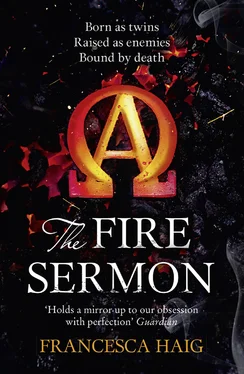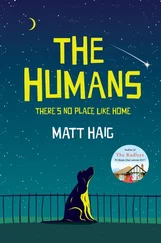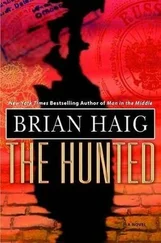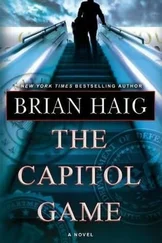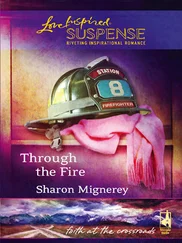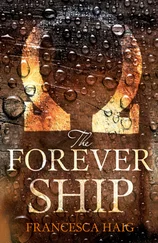Everyone knew that many seers went mad – that over years the visions burned our minds away. The visions were flame, and we were the wick. This man wasn’t a seer, but it didn’t surprise me that anyone held for long enough in the Keeping Rooms would go mad. What chance, then, for me, contending with the visions at the same time as the unrelenting walls of my cell? In a year or two, I thought, that might be me, counting out my footsteps as if the neatness of numbers could impose some order on a broken mind.
Between me and the pacing man was another prisoner, perhaps a few years older than me, a one-armed woman with dark hair and a cheerful face. It was the second time we’d been taken to the ramparts together. I walked as close to the edge of the ramparts as the guards would allow, and stared beyond the sandstone crenellations as I tried to contrive some way that I might speak or signal to her. I couldn’t get close enough to the edge to get a proper look at the city that unfolded beneath the mountainside fort. The horizon was curtailed by the ramparts, beyond which I could see only the hills, painted grey with distance.
I realised the counting had stopped. By the time I’d turned around to see what had changed, the older Omega had already rushed at the woman and gripped her neck between his hands. With only one arm she couldn’t fight hard enough or cry out quickly enough. The guards reached them while I was still yards away, and in seconds they’d pulled him off her, but it was too late.
I’d closed my eyes to block the sight of her body, face down on the flagstones, head turned sideways at an impossible angle. But for a seer there’s no refuge behind closed eyelids. In my shuddering mind I saw what else happened at precisely the moment that she died: a hundred feet above us, inside the fort, a glass of wine dropped, sharding red over a marble floor. A man in a velvet jacket fell backwards, scrambled for a second to his knees, and died, his hands to his neck.
After that, there were no more trips to the ramparts. Sometimes I thought I could hear the mad Omega shouting and thrashing the walls, but it was only a dull thud, a throb in the night. I never knew whether I was really hearing it, or just sensing it.
Inside my cell, it was almost never dark. A glass ball suspended in the ceiling gave off a pale light. It was lit constantly, and emitted off a slight buzz, so low that I sometimes wondered whether it was just a ringing in my own ears. For the first few days I watched it nervously, waiting for it to burn out and leave me in total darkness. But this was no candle, not even an oil lamp. The light it gave off was different: cooler, and unwavering. Its sterile light only faltered every few weeks, when it would flicker for several seconds and disappear, leaving me in a formless black world. But it never lasted more than one or two minutes. Each time the light would return, blinking a couple of times, like somebody waking from sleep, before resuming its vigil. I came to welcome these intermittent breakdowns. They were the only interruptions from the light’s ceaseless glare.
This must be the Electric, I supposed. I’d heard the stories: it was like a kind of magic, the key to most of the technology from the Before. Whatever it had been, though, it was supposed to be gone now. Any machines not already destroyed in the blast had been done away with in the purges that followed, when the survivors had destroyed all traces of the technology that had brought the world to ash. All remnants of the Before were taboo, but none more than the machines. And while the penalties for breaking the taboo were brutal, the law was mainly policed by fear alone. The danger was inscribed on the surface of our scorched world, and on the twisted bodies of the Omegas. We needed no reminders.
But here was a machine, a piece of the Electric, hanging from the ceiling of my cell. Not anything terrifying or powerful, like the things people whispered about. Not a weapon, or a bomb, or even a carriage that could move without a horse. Just this glass bulb, the size of my fist, blaring light at the top of my cell. I couldn’t stop staring at it, the knot of extreme brightness at its core, sharply white, as though a spark from the blast itself were captured there. I stared at it for so long that when I closed my eyes the bright shape of it was etched on my eyelids’ darkness. I was fascinated, and appalled, wincing beneath the light in those first days as though it might explode.
When I watched the light, it wasn’t only the taboo that scared me – it was what this act of witness meant for me. If word got out that the Council was breaking the taboo, there’d be another purge. The terror of the blast, and the machines that had wrought it, was still too real, too visceral, for people to tolerate. I knew the light was a life sentence: now I’d seen it, I’d never be allowed out.
More than anything else, I missed the sky. A narrow vent, just below the ceiling, let in fresh air from somewhere, but never even a glimpse of sunlight. I calculated time’s passage by the arrival of food trays twice a day through the slot in the base of the door. As the months since that last visit to the ramparts receded, I found I could recall the sky in the abstract, but couldn’t properly picture it. I thought of the stories of the Long Winter, after the blast, when the air had been so thick with ash that nobody saw the sky for years and years. They say there were children born in that time who never saw the sky at all. I wondered whether they’d believed in it; whether imagining the sky had become an act of faith for them, as it now was for me.
Counting days was the only way I could cling to any sense of time, but as the tally grew it became its own torture. I wasn’t counting down towards any prospect of release: the numbers only climbed, and with them the sense of suspension, of floating in an indefinite world of darkness and isolation. After the visits to the ramparts were stopped, the only regular milestone was The Confessor coming each fortnight to interrogate me about my visions. She told me that the other Omegas saw no one. Thinking of The Confessor, I didn’t know if I should envy or pity them.
*
They say the twins started to appear in the second and third generations of the After. In the Long Winter there were no twins – barely any births at all, and fewer who survived. They were the years of melted bodies and failed, unrecognisable infants. So few lived, and fewer still could breed, so that it seemed unlikely humans would carry on at all.
At first, in the struggle to repopulate, the onslaught of twins must have been greeted with joy. So many babies, and so many of them normal. There was always one boy and one girl, with one from each pair perfect. Not just well formed, but strong, robust. But soon the fatal symmetry became evident; the price to be paid for each perfect baby was its twin. They came in many different forms: limbs missing, or atrophied, or occasionally multiplied. Absent eyes, extra eyes, or eyes sealed shut. These were the Omegas, the shadow counterparts to the Alphas. The Alphas called them mutants, said they were the poison that Alphas cast out, even in the womb. The stain of the blast that, while it couldn’t be removed, had at least been displaced onto the lesser twin. The Omegas carried the burden of the mutations, leaving the Alphas unencumbered.
Not entirely unencumbered, though. While the difference between twins was visible, the link between them was not. But it nonetheless asserted itself, every time, in the most unanswerable way. It made no difference that nobody could understand how it worked. At first, they might have dismissed it as coincidence. But gradually, disbelief was overruled by fact, by the evidence of bodies. The twins came in pairs, and they died in pairs. Wherever they were, and no matter how far apart, whenever someone died, their twin died too.
Читать дальше
